Co-urbanism 2017: speakers
Autorius: Laimikis.lt
Eng: Here you will find the profiles of Co-urbanism 2017 speakers. The annual practical forum in participatory urban culture focuses on practical methods and issues in inclusive urban development and the role of arts-based approaches in it, and brings together practitioners and researchers from Kaunas, Minsk, Riga, St. Petersburg and Vilnius. Annual Co-urbanism forum is hosted by urban games and research lab Laimikis [2o15 • 2o16 • Co-urbanism videos 2015].
A list of presenters [more info below]: • Albertas Kazlauskas (Gatvės Gyvos, Vilnius) • Tomas S. Butkus (Vario Burnos, Vilnius) • Jekaterina Lavrinec (Laimikis.lt, Vilnius) • Vita Gelūnienė & Ed Carroll (Šančiai, Kaunas) • Eugenijus Kaminskis & Ieva Nagytė (Kurk Lietuvai!) • Jonas Büchel (Urban Institute in Riga) • Rasa Chmieliauskaitė (TẽKA, Kaunas) • Jogintė Bučinskaitė (Vilnius) • Rūta Matonienė (Urban Development Department, Vilnius city administration) • Adelė Dovydavičiūtė (Open House Vilnius) • Kaspars Lielgalvis (Totaldobže Art Centre, Riga) • Agnia Asanovich (Minsk) • Aleksandra Nenko (Arts4City, St. Petersburg) • Dovilė Gaužauskienė (Vilnius college of Design, Kaunas) • Renata Domeikaitė (Miesto Laboratorija, Vilnius) • Evelina Šimkutė (Šilainiai Photo, Kaunas)
LT: Skelbiame informaciją apie Co-urbanism 2017 dalyvius! Kasmetinis praktinis forumas, skirtas miesto erdvių vystymui įtraukiant miestiečius. Vertingas, nes suburia praktikus ir prakalbina juos apie metodus. Naudingas, nes leidžia užmegzti kontaktų tinklą (tam ir sukurtas). Skirtas ir aktyviems miestiečiams, miesto žinovams bei strategams. Šių metų kalba – anglų, nes trečią kartą rengiamas forumas pritraukė urbanisturs, savivaldybių bei kultūros sektoriaus veikėjus iš Švedijos, Lenkijos ir Latvijos.
The programs for the event are here | Renginio programa (anglų k.):
• Co-urbanism-2017-LOGO.pdf
• Co-urbanism-2017-Urbingo.pdf
• Kaspars Lielgalvis (Totaldobžė Art Center, Latvia) will speak about cultural revitalisation of empty buildings in Latvia. A title of his presentation is: “Totaldobže Art Centre in empty buildings of Riga and Liepāja“. Kaspars is an artist, curator, art manager and culture activist. He is co-founder of Art Centre “Totaldobže” which has become an experimental platform for cross-over creation and meeting for artists, poets, musicians, dancers and representatives from other culture disciplines in Riga. Since 2008 in collaboration with other artists and institutions “Totaldobže” has organized more then 300 contemporary art events – artist talks, art exhibitions, experimental workshops, interdisciplinary concerts, poetry slams, public discussions, international interdisciplinary festival and other types of contemporary art activities in Riga, Liepāja and outside Latvia – in Estonia and Spain. Since 2014 “Totaldobže” is producing printed Riga Culture maps and online culture events calendar culturemap.lv.
LT: Legendinis Rygos ir Liepojos apleistų pastatų reanimatorius Kaspars Lielgalvis dalinsis savo patirtimi prikeliant vieną po kito apleistus pastatus. Jo pranešimo tema: “Totaldobže Art Centre in empty buildings of Riga and Liepāja”. Taip pat patikrinkite: jo kuruojamą kultūros renginių kalendorių Latvijoje. Kaspars atviras bendradarbiavimui, apjungiant skirtingų šalių renginių kalendorius.
• Rasa Chmieliauskaitė, Kaunas-based architect, is an active member of social-cultural movements. She is a member of TẽKA – a creative community that seeks to bring interconnections between Kaunas cultural life and the river. The community arranges events, discussions, provocative actions asking, how Kaunas could live WITH the river (not just by the river). How the river can be a source of city life, identity and inspiration. Her presentation at Co-urbanism 2o17 is “TẽKA riverbank revival – City and the River”
Vita Gelūnienė and Ed Carroll (Šančiai, Lithuania / Ireland) are community artists who work independently of institutions in collaboration with others in the area of community culture. Their practice is durational, involves artistic research and engages publics in spaces where community, culture and politics collide.
• Albertas Kazlauskas is a founder and permanent tour guide of gatvės gyvos (“Streets Alive”, Vilnius). It is a cultural initiative suggesting residents of Vilnius city to discover the quarters of the town that are usually out of the touristic route and considered to be trivial, insignificant. The main intention of „Streets Alive“ is to give the opportunity for every person, despite of financial or social situation, to explore and develop their knowledge about the urban space they inhabit. On April 7 at Co-urbanism 2o17 Albertas will share his urban discoveries: “Discover and Change“.
• LT: 2015 m vasarą gimusi iniciatyva kviečia Vilniaus miesto gyventojus į nemokamas ekskursijas netradiciniais maršrutais, suteikiančiais galimybę pažinti miesto rajonus, erdves už įprasto turistinio tako ribų. Pagrindinis „Gatvės gyvos“ tikslas – suteikti galimybę visiems žmonėms kartu tyrinėti ir giliau pažinti savo miestą. Albertas Kazlauskas yra šios iniciatyvos autorius ir nuolatinis ekskursijų vedlys. Balandžio 7 d. Albertas pasidalins savo atradimais: “Daugeliui miestiečių ekskursijos yra bene vienintelė proga pakelti akis nuo žemės ar ekranų ir pamatyti labai įvairialypį Vilniaus veidą iš šono. Šių pažinčių metu netiesiogiai susipažįstama su geromis ir blogomis miesto vystymosi praktikomis. Kokie konkretūs pavyzdžiai įkvėpia, o kurie liūdina, ir kodėl?”
• Jekaterina Lavrinec, Ph.D., urban researcher, participatory artist and educator in Urban studies. She is a co-founder of Laimikis.lt – urban games and research lab that serves as an interdisciplinary platform for cultural innovations, non-formal learning and promotes participatory urban culture by launching creative communities’ initiatives in urderused urban spaces. As an assoc.prof. at Vilnius Gediminas Technical University, where she co-founded Creative Industries program, she teaches courses in Urban Studies and Creative Communication in Public Spaces. Since 2012 she has been curating annual arts and research week for urban interventions in public spaces “priARTink!” (pARTicipate). In her art and research activities she focuses on the issues of the perception of urban environment, user experience in public space, temporal urban solidarities and cooperation. Some of the examples of her work can be found here: behance/Laimikis. Jekaterina is an ainitiator and a curator of Co-urbanism forum. In her presentation “Co-urbanism 2o17: participatory approaches in urban regeneration” she will overview the challenges and tendencies in cooperative urban development in Lithuania and in the Baltic Sea Region.
• Jekaterina Lavrinec, humanitarinių mokslų daktarė, ir pirmųjų miesto studijų kursų, dėstomų Lietuvos universitetuose (VGTU, TPSMI, VU TVM) bei užsienyje (Samaros valstybinis universitetas) nuo 2007 autorė, nuo 2004 m. yra paskelbusi dešimčius mokslinių straipsnių, skirtų naudojoto patyrimui miesto erdvėse ir kūrybinių intervencijų vaidmeniui reorganizuojant naudotojo patyrimą viešosiose erdvėse [ResearchGate, Academia.edu]. Ji yra pirmojo Lietuvoje tarpdisciplininėms miesto studijoms skirto rinkinio sudarytoja [Co-Activity: Philosophy. Communication, 2014, Vol 22, No 1]. Santykis tarp miesto erdvių organizacijos ir naudotojo patyrimo yra centrinis klausimas ir jos praktinėje veikloje: taikydama dalyvaujamojo meno principus, ji nuo 2007 m. vysto metodus ir įrankius, skirtus viešųjų erdvių gaivinimui bei bendruomeninių erdvių vystymui kaimynijose (darbų pavyzdžiai). Bendruomeninių ryšių formavimas per miestiečių įtraukimą į kūrybines vietodaros / vietokūros veiklas yra viena iš jos veiklos sričių nuo 2007.
 • Co-urbanism 2o17 speaker Agnia Asanovich (Minsk) will present an Urban game #PlayHelloCity. According to Agnia, “this adventurous game invites players to experience community affiliation in the city/neighborhood. The goal is to prove that small interventions can start positive change in our environment. The game exists in a card format and has for each week a fascinating challenge (52 cards for 52 weeks in a year). Some of the tasks develop self-understanding, some focus on discovering new spaces or urban values, others foster meeting various stakeholders of the city. The mini-actions are designed to be solved during the daily routine consuming minimum amount of time and resources. During this playful journey players engage with new perspectives and get to know their neighbors and themselves better. They discover visible or invisible obstacles and potentials of the urban phenomena that influence their relationship with the city and shape their role in the community.”
• Co-urbanism 2o17 speaker Agnia Asanovich (Minsk) will present an Urban game #PlayHelloCity. According to Agnia, “this adventurous game invites players to experience community affiliation in the city/neighborhood. The goal is to prove that small interventions can start positive change in our environment. The game exists in a card format and has for each week a fascinating challenge (52 cards for 52 weeks in a year). Some of the tasks develop self-understanding, some focus on discovering new spaces or urban values, others foster meeting various stakeholders of the city. The mini-actions are designed to be solved during the daily routine consuming minimum amount of time and resources. During this playful journey players engage with new perspectives and get to know their neighbors and themselves better. They discover visible or invisible obstacles and potentials of the urban phenomena that influence their relationship with the city and shape their role in the community.”
Ahniya Asanovich holds MSc Politics and Administration (CoE, Belgium), co-developer of the Playhellocity urban game, Egalite Inclusive Media School founder, urbanist, interpreter (FR/EN-RU/BY), PR and Advocacy specialist, policy analyst and social projects coordinator. The title of her presentation is “Urban game Playhellocity – 52 ideas of how to liven up your city”.
• LT: Miesto žaidimų megėjams: balandžio 7 d. Co-urbanism 2o17 metu Agnia Asanovich (Minskas) pristatys užduočių žaidimą “Play Hello City”, kuris skirtas įtraukti gyventojus į savo aplinkos pagerinimą per seriją interaktyvių užduočių.
• Tomas S. Butkus is an independent publisher, editor-in-chief of Vario burnos and Co-urbanism 2o17 speaker! He will share innovative approaches in spatial learning. According to Tomas, one of the challenges for contemporary society has become an ability to connect elements and to see a panoramic view. That’s how the idea to start arranging creative workshops for spatial learning has emerged. The title of his presentation is “Universe Minor” – Spatial Education Workshop for Children.
• Kas neturėjo galimybės apsilankyti erdvinio lavinimo dirbtuvėse, kurias organizuoja Tomas S. Butkus, turės galimybę sužinoti apie jas Co-urbanism 2o17 metu! Pranešimo pavadinimas “Mažoji Visata – erdvinio lavinimo dirbtuvės vaikams“. Pasak Tomo, “daugybę metų žmonės mokėsi skaidymo meno. Taip radome molekules, atomus, kvarkus. Regis, šiandienos visuomenėse pagrindiniu iššūkiu tampa gebėjimas jungti dalykus į visumą, matyti panoraminį vaizdą. Taip gimė mintis sukurti dirbtuves, kur būtų lavinamas erdvinis mąstymas, mokoma bazinių kūrybinių principų, ieškoma daiktų ir reiškinių sąryšingumo”. Vilnius Gedimino technikos universitete Tomas įgijo architekto specialybę, o nuo 1992 m. savo įkurtose Vario burnos idėjų dirbtuvėse dirba idėjų meno srityje, jungiančioje dizaino, leidybos, literatūros, urbanistikos ir kitas menines bei mokslines iniciatyvas. Paskelbė dešimtį mokslinių straipsnių ir porą mokslinių monografijų. Per porą dešimtmečių išleido kelias dešimtis poezijos, eksperimentinės muzikos, grafikos ir iliustruotų istorijų vaikams leidinių, kurie laimėjo aibę premijų Lietuvoje ir užsienyje.
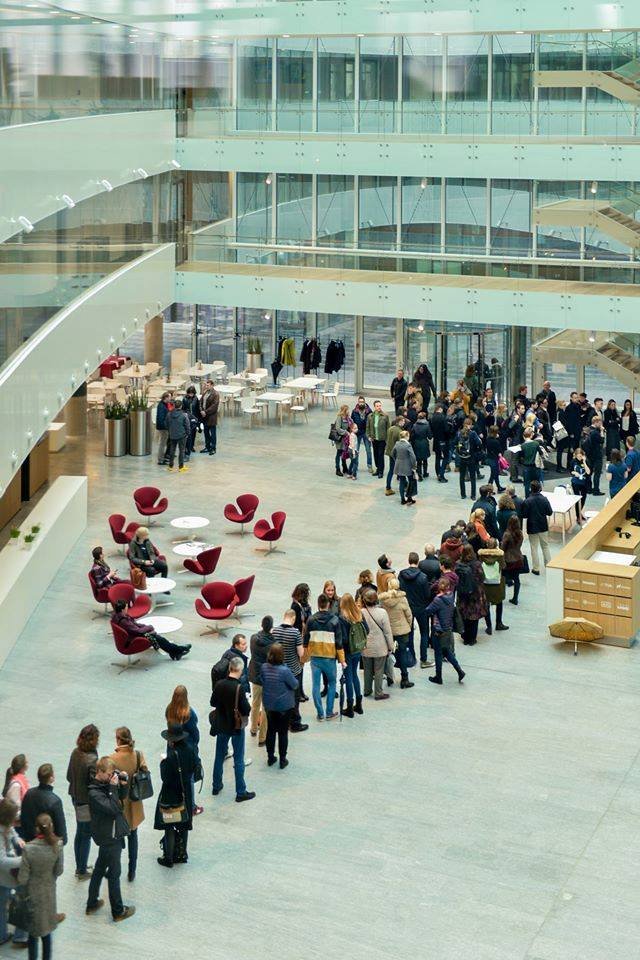 • Open House Vilnius team presents an architecture weekend during which usually or partly inaccessible buildings in Vilnius city open their doors to the public. This year April 22nd-23rd OHV event will take place for the third time. Event is organised by public institution “Architektūros fondas”. At the conference Open House Vilnius will be presented by an architect, active in architecture education field and one of the event organizers Adelė Dovydavičiūtė.
• Open House Vilnius team presents an architecture weekend during which usually or partly inaccessible buildings in Vilnius city open their doors to the public. This year April 22nd-23rd OHV event will take place for the third time. Event is organised by public institution “Architektūros fondas”. At the conference Open House Vilnius will be presented by an architect, active in architecture education field and one of the event organizers Adelė Dovydavičiūtė.
In her presentation “Open House Vilnius – opening eyes, minds and doors” she will speak about the event’s influence to the city and it’s society. What are the challenges in the process of organizing the event? Why could event be called phenomenon and also a challenge for the city? Where are the secrets of great attendance and the whole event hidden?
• Renata Domeikaitė will discuss the challenges in creating green community education center. Renata is a member of Miesto Laboratorija – a green community education center, based in Vilnius, Sapiegos Park. It’s a group of young, motivated people who are introducing sustainable lifestyle ideas to urban Vilnius. The center aims to be an incubator for sustainable city ideas and eco-friendly initiatives that could be easily brought into the daily lifestyle of the urban resident. Miesto Laboratorija aims to gather urban residents and help them to learn how to save energy, how to recycle, implement and take care of vertical gardens (using hydroponics system) and small scale DIY projects. Such center serves as a platform that could provide advice and help to the local communities in transition towards sustainability. Having knowledge about similar initiatives around the globe (e.g. de Ceuvel (Amsterdam) and other), they believe that such center could also be a great sightseeing attraction for the tourists.
• Ieva Nagytė and Eugenijus Kaminskis are participants of “Create Lithuania” programme. Through the analysis of various case studies, they explored the applicability of creative placemaking in Lithuania. Their topic is “Creative placemaking in Lithuania: challenges and opportunities”. According to Ieva and Eugenijus, “Although creative placemaking is relatively new to the Lithuanian context, there are multiple examples of cultural/creative projects throughout the country, which use its methods. Ieva and Eugenijus will introduce good Lithuanian practices and discuss their challenges, strengths and opportunities”. Researching various interactions between communities, project managers, businesses and governmental institutions, they looked into how comprehensive partnerships can help revitalising and developing quality places. After delivering recommendations to the Ministry of Culture and creating a practical guide for cultural project managers, they continue to promote creative placemaking in various formats.
• LT: Ieva Nagytė ir Eugenijus Kaminskis yra programos Kurk Lietuvai dalyviai, tyrinėję kūrybiškos vietokūros pritaikomumo Lietuvoje problematiką. Dirbę su bendruomenėmis, kūrėjais, verslais ir savivalda, jie ieškojo, kaip visapusiškos partnerystės gali pagelbėti kokybiškų vietų atgaivinimui ir kūrimui. Pateikę rekomendacijas Kultūros ministerijai ir suformavę praktinį gidą projektų vykdytojams, Eugenijus ir Ieva toliau įgyvendina kūrybiškos vietokūros sklaidą įvairiuose formatuose. Jų pranešimas – “Kūrybiška vietokūra Lietuvoje: iššūkiai ir galimybės”.
Rūta Matonienė, Deputy Director, Urban development Department , Vilnius City Administration. Graduated from Vilnius Academy of Fine Arts, faculty of Urban planning and landscape architecture. Being responsible for city development strategy Rūta coordinates projects on urban planning and regeneration, strategic development issues, advises on a suitable location for new Brownfield Greenfield developments, responsible for international cooperation with private and public sector. Rūta has an explicit experience in management of EU financed projects’ on behalf of Vilnius City. She will present a program for regeneration of public spaces in residential areas in Vilnius.
Jonas Büchel, a leader of Riga Urban Institute has 25 years experience in design, social & cultural work, event management and creative urbanism practice in nearly all European regions as well as in Asia and the Caucasian region. In the last 15 years concentrating on Berlin, Croatia, Bosnia i Herzegovina, Central-Finland and the Baltic States, specifically Latvia and its capital Riga. The title of his presentation for Co-urbanism 2o17 is “The miracle power of smallest communities and challenged territories”. Jonas will overview the activities and approaches of empowering smallest communities in rural as well as in agglomeration contexts.
“Foci are two communities, of which one stands for a city complexity, a permaculture community in the heart of Riga, while the other represents a typical example of deepest rurality, a tiny assembly of human life at the Latvian-Lithuanian border. Both communities have been part of the Community Development Training project in Latvia, carried out by the Urban Institute during 2013 and 2016”.
Jogintė Bučinskaitė is a cultural journalist working for the Lithuanian National Television weekly cultural show The Door Opens (Durys atsidaro). In 2016 she made her curatorial debut as the co-curator of a group exhibition titled The Body of the Letter at the Sodu 4 project space in Vilnius. The topic of her interest is the tension between the practical and theoretical communication of contemporary art.
In her presentation Jogintė will reflect the tensions emerging around monuments in public space and the role of cultural media in the emerging debates. The title of her presentation at Co-urbanism 2o17 is Sculptural Ventriloquism in the Age of Marginalized Cultural Media (“Skulptūrinė pilvakalbystė kultūrinės žiniasklaidos devalvacijos amžiuje”).
Aleksandra Nenko (St. Petersburg) is a founder of ARTS4CITY – a multidisciplinary project team focused on developing contemporary urban culture in St. Petersburg. She has received her PhD in sociology from Kiev National University. Now she works as an associate professor at the Institute for Design and Urban Studies (St. Petersburg). In her paper she will explore the role of libraries in the developing sustainable local networks.
“ARTS4CITY is aimed at developing different soft technologies which can animate the city. We have tried out short-term and long-term tools and we tackle different urban issues – activating local communities where neighbours do not know each other, animating non-places – abandoned and neglected city areas, redesigning public spaces which are mono-functional or boring. The examples of our tools are urban walks, urban games, neighbor parties, urban festivals, urban kitchen, and others. We also put a big stress on education and public events which give chances for young urban researchers and activists to learn more about cultural technologies in the city. ARTS4CITY is an international project, bringing together researchers and artists from different European cities and supported by many partners from education, international cooperation, government, and civil society”.
Mano kiemas. Kaunas. Šilainiai from alchemija on Vimeo.
Evelina Šimkutė is an artist and curator. Her professional interest lay in community based, site specific art practices as well as participatory creative models. In 2012 Evelina graduated from the Central Saint Martins College of Art and Design and she is working between London, UK and Kaunas, Lithuania. She is currently leading two socio-cultural projects based on the practice of de-centralization: Šilainiai Photo and Šilainiai Project in the micro-district of Šilainiai, Kaunas.
The microdistrict of Šilainiai is the largest residential complex in the city of Kaunas, Lithuania. Built in 1980s, the area and its residents make up more than 50,000 people, however there are currently no space or centre for cultural events or activities. The local library is the only non-commercial space for residents to come together or to have any sense of a community gathering. They usually have to travel to the town centre or the countryside in order to spend any leisurely time.
During her research into the history of Šilainiai, Evelina had discovered a large number of creative people living and producing work within this area, but later found out that none of them had any recognition whatsoever: “I found that young people of whom desire to follow a creative path were unable to pursue their ambitions, due to the lack of support and space for them to practice and share ideas. Even a larger number of residents who simply want to engage in activities closer to home or after work, there is no place for. Having lived in Šilainiai myself, I have noticed that the people within this district have become disconnected and the communities fragmented”.


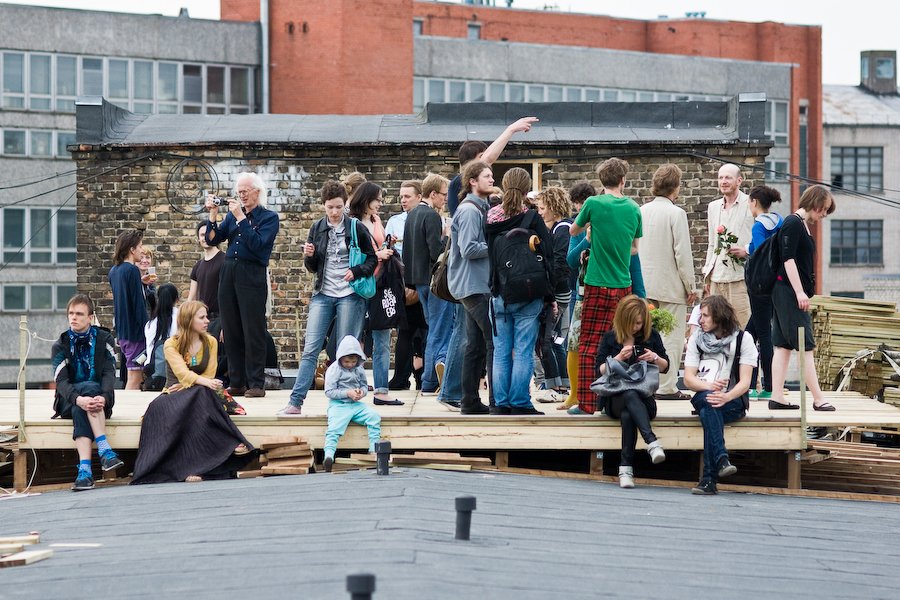

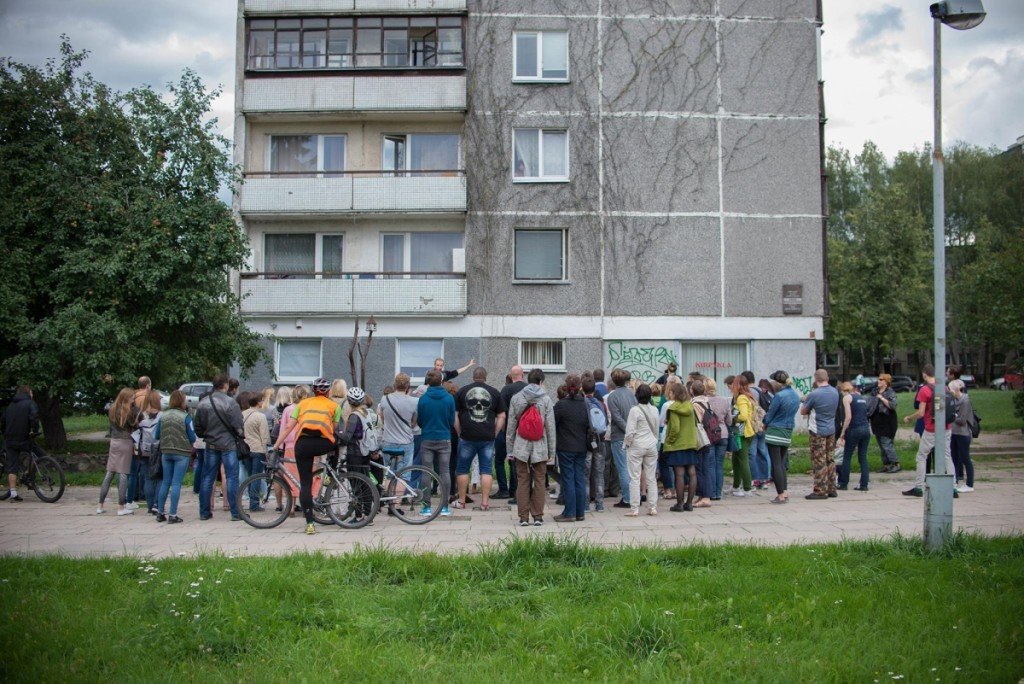
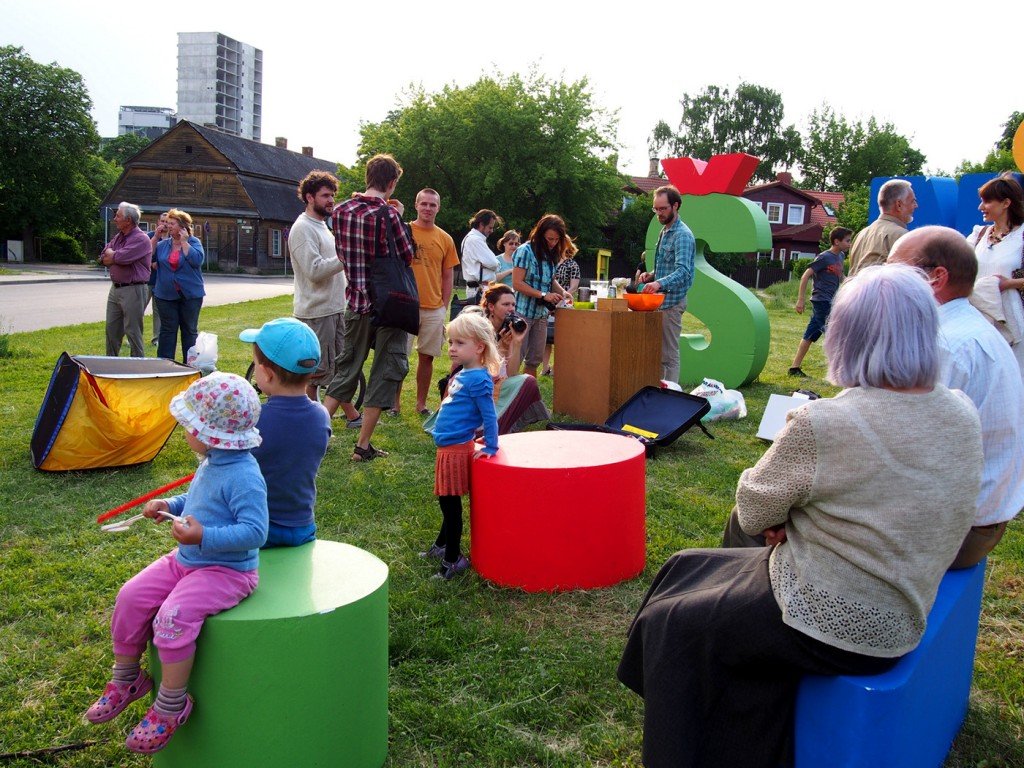
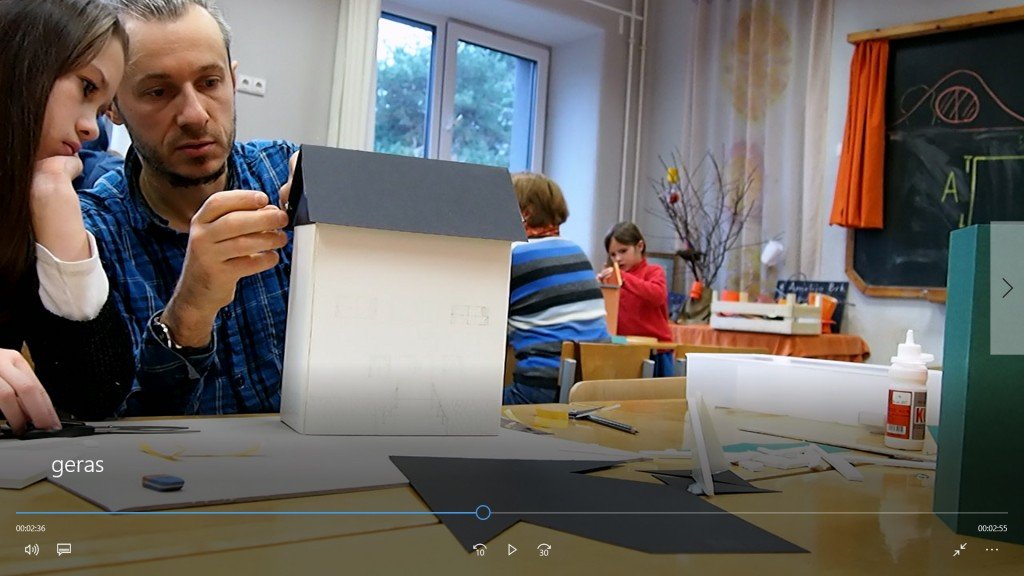
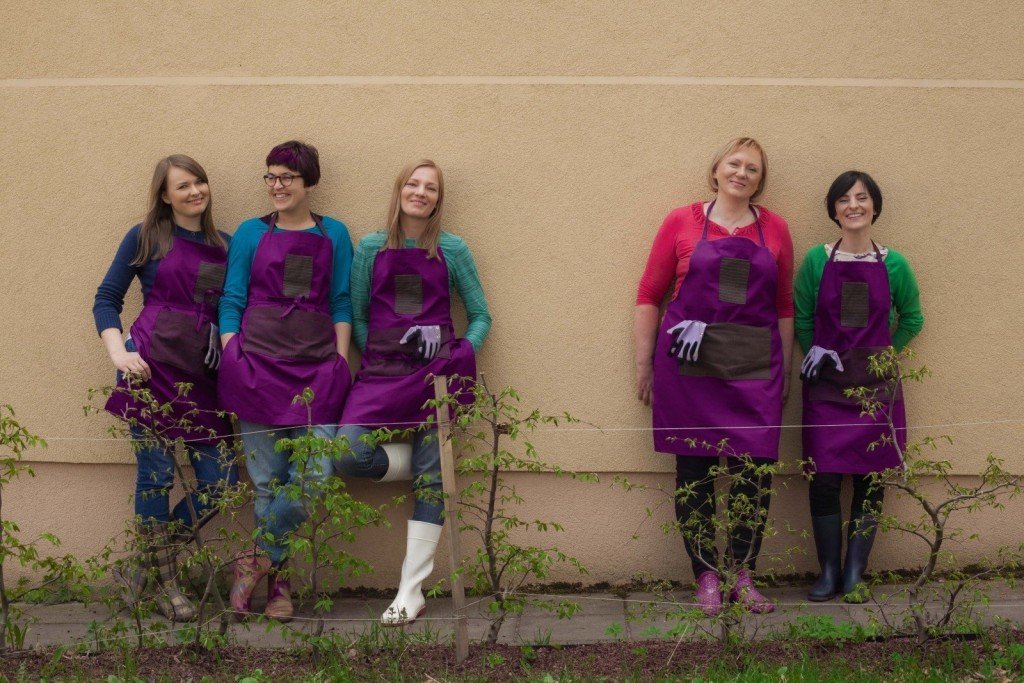
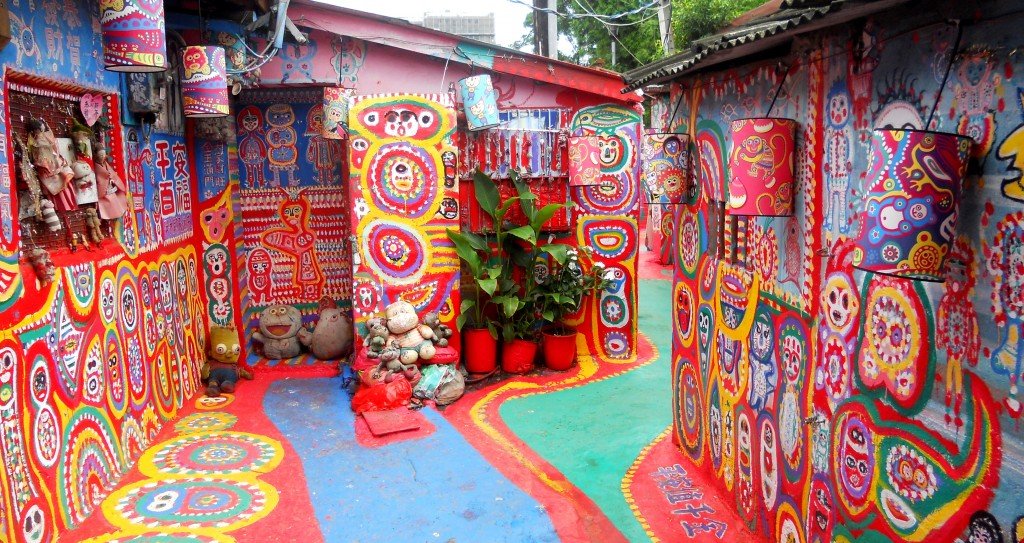
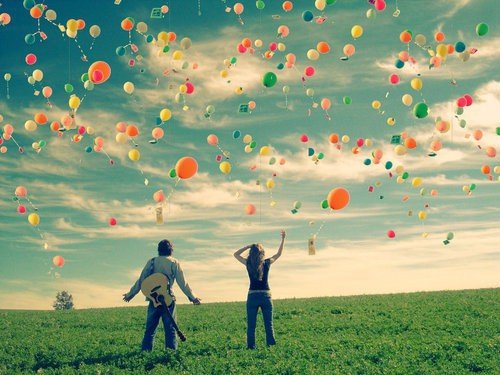
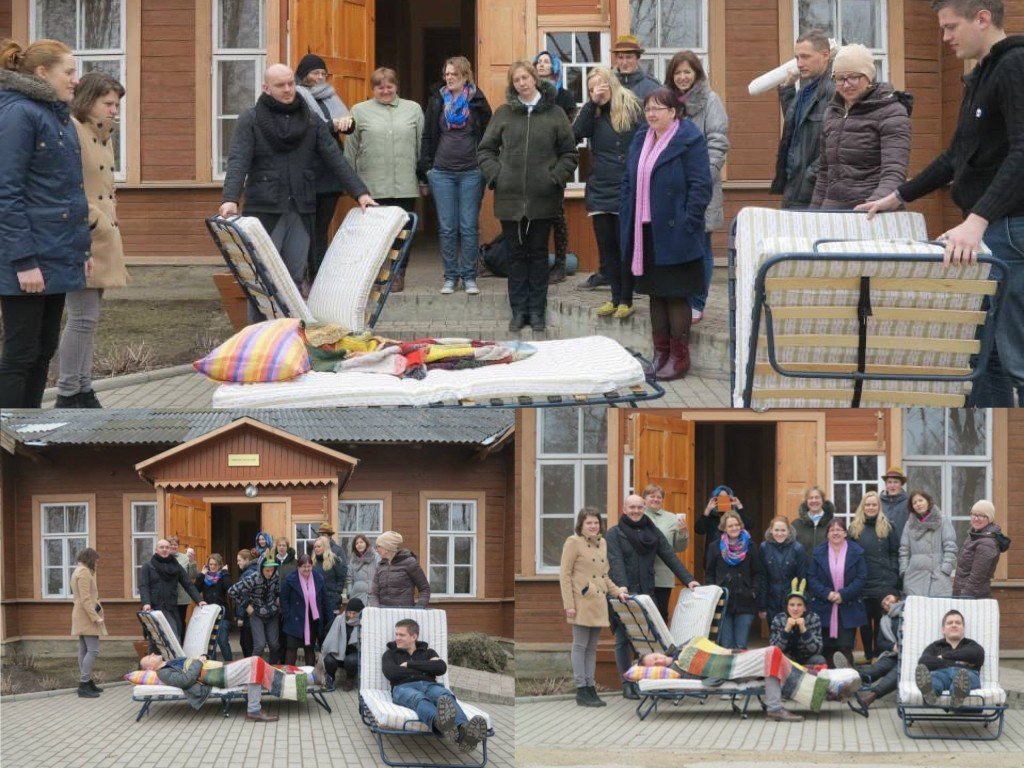



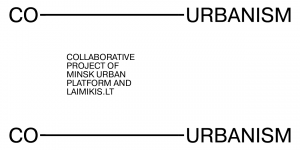
 2o15: "
2o15: "
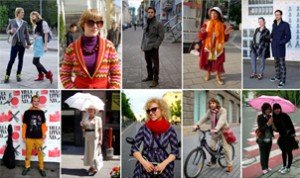
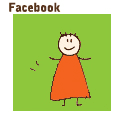

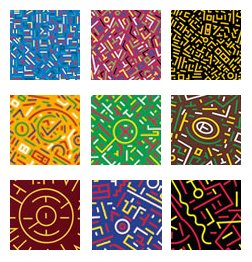
[…] • April 7, 13.3o – 19.oo: Swedbank, Konstitucijos ave. 20 A: Co-urbanism 2017 – Program.pdf (zoom in) • April 8, 12.oo – 13.4o: Dragon’s field at Šnipiškės: Co-urbanism 2o17 – URBINGO.pdf • Profiles of the invited speakers (continue to be updated): facebook page and are re-published on Laimikis site. […]
Palik komentarą! |Leave your response!